As an affiliate, we may earn a commission from qualifying purchases. We get commissions for purchases made through links on this website from Amazon and other third parties.
Fitness trackers and smartwatches can be excellent tools for tracking your fitness progress and achieving your health goals. However, many of today’s fitness trackers heavily rely on Bluetooth technology to function efficiently. While this may seem standard, it’s worth considering the potential exposure to electromagnetic radiation from both the device and your smartphone, especially when they are in close proximity to your body.
Fortunately, there is a category of fitness trackers known as standalone fitness trackers that do not require Bluetooth connectivity to operate. These devices are self-sufficient and do not depend on a smartphone or computer for their functionality. Some of these trackers may include Bluetooth sensors, but the good news is that you can disable these sensors when you don’t need to sync your fitness data with your smartphone.
| Image | Product Name | Editor's Rating | Price |
|---|---|---|---|
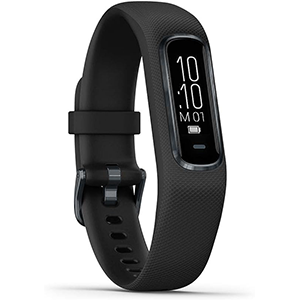 | Garmin vivosmart 4 | Check Price | |
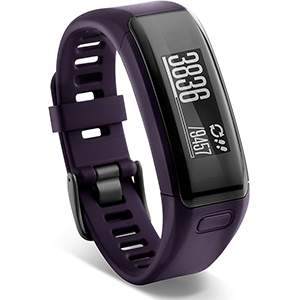 | Garmin vívosmart HR | Check Price | |
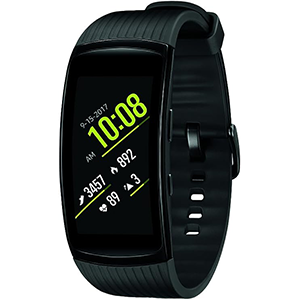 | Samsung Gear Fit2 Pro | Check Price | |
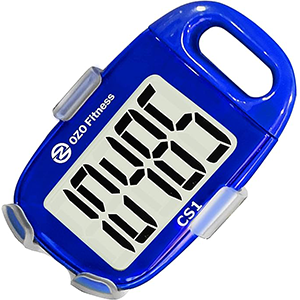 | OZO Fitness CS1 | Check Price | |
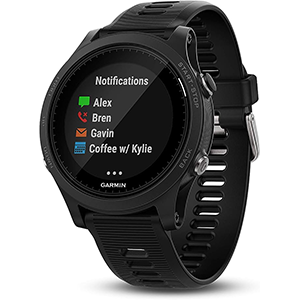 | Garmin Forerunner 935 | Check Price |
Best Fitness Tracker Without Bluetooth Reviews
After conducting thorough research and testing various smartwatches and fitness trackers available in the market, I’m here to share my top picks for the best non-Bluetooth fitness trackers. These options cater to individuals who prefer a wireless radiation-free experience and those who are willing to disable Bluetooth features when not needed.
Below, I will highlight my top choices for the best fitness trackers that either do not feature Bluetooth at all or can be used without activating Bluetooth connectivity, which is often enabled by default on these devices.
1. Garmin vivosmart 4
At the top of our list is the impressive Garmin vívosmart 4 fitness tracker. What sets this device apart is its ability to function without the need for a Bluetooth connection. Even though it comes equipped with Bluetooth capability, you have the option to disable it completely if you prefer not to use it.
In terms of features, the Garmin vívosmart 4 offers a wide range of functionalities, making it a compelling choice, especially given its price point. You’ll find almost all the features typically available on modern fitness trackers, including seamless synchronization of your fitness data with the Garmin Connect app.
Some of the notable features of the Garmin vívosmart 4 include advanced sleep monitoring with REM sleep analysis, measurement of blood oxygen saturation levels, continuous heart rate monitoring, all-day stress tracking, a relaxation breathing timer, Vo2 Max monitoring, and more. Additionally, it includes specialized activity tracking modes for various sports and exercises such as running, swimming, yoga, and more.
While the Garmin vívosmart 4 does come with Bluetooth capability, it’s important to know that you can easily disable it when not in use. To do this, simply connect the tracker to your smartphone using the Garmin Connect app, then access the settings and navigate to Bluetooth > Status > Off within the app to deactivate Bluetooth on the tracker entirely.
Keep in mind that with Bluetooth turned off, the fitness tracker won’t be able to sync your fitness data with your phone, and unsynced data will be deleted after two weeks. It’s advisable to enable Bluetooth at least once a day to ensure your fitness data is fully synced with your Garmin Account, all while enjoying a radiation-free experience during the rest of the day.
2. Garmin vívosmart HR
Another remarkable fitness tracker in Garmin’s lineup is the Garmin vívosmart HR, and just like its sibling, it doesn’t rely on a Bluetooth connection to function. However, it is Bluetooth-enabled to allow pairing with your smartphone for additional features, but the Bluetooth functionality can be easily deactivated if you choose not to use it.
Pairing your smartphone with this fitness tracker unlocks a range of features, including music playback control, smart notifications, camera control, and more, all accessible directly from the tracker.
The Garmin vívosmart HR boasts a sleek and stylish design while offering comprehensive fitness tracking capabilities. It can monitor various aspects of your fitness journey, including steps taken, distance traveled, calories burned, heart rate, floors climbed, activity intensity, and much more. Notably, its display remains highly visible even under bright lighting conditions or when used outdoors.
Similar to the Garmin vívosmart 4 mentioned earlier, the Garmin vívosmart HR also provides the option to completely disable Bluetooth connectivity when it’s not needed. To do this, simply connect the tracker to your smartphone via the Garmin Connect app, then navigate to Settings > Bluetooth > Status > Off.
In summary, the Garmin vívosmart HR is an exceptional and budget-friendly fitness tracker that stands out for not requiring Bluetooth for basic fitness tracking functions. While it offers Bluetooth capability for syncing fitness data with your smartphone, this feature can be easily toggled on or off based on your preferences, providing flexibility and choice for users.
3. Samsung Gear Fit2 Pro
The Samsung Gear Fit2 Pro stands out as a stylish fitness tracker from Samsung, and similar to the other trackers on this list, it operates independently without requiring a Bluetooth connection to function.
In terms of features, the Samsung Gear Fit2 Pro is a robust standalone fitness tracker. It boasts a range of fitness functionalities, including heart rate monitoring, calorie expenditure tracking, GPS-enabled activity tracking, and more. Additionally, it’s designed to be water-resistant up to 50 meters, making it suitable for use during swimming, showers, or even handwashing without any concerns.
Beyond fitness tracking, the Samsung Gear Fit2 Pro offers additional compelling features, such as onboard music playback, resistance to dust and scratches, and enhanced fitness tracking capabilities through third-party apps like MyFitnessPal and MapMyRun.
As with the other fitness trackers mentioned, you have the option to disable Bluetooth connectivity on the Samsung Gear Fit2 Pro if you don’t require or use it. To do this, simply press the Power button on the fitness tracker and navigate to Settings > Connections > Bluetooth > Status > Off to completely deactivate Bluetooth on the device.
Please keep in mind that disabling Bluetooth means you won’t be able to sync your fitness data with your smartphone or utilize third-party apps like MyFitnessPal, Strava, and MapMyRun, which rely on the tracker’s connection to your phone. It’s advisable to connect the fitness tracker to your smartphone via Bluetooth at least once a day to ensure your fitness data remains accessible and up-to-date.
4. OZO Fitness CS1
The OZO Fitness CS1 Simple Step Tracker, as the name suggests, is a straightforward step tracking device and the second fitness tracking product from OZO featured on this list.
Similar to the OZO CS2 Digital Pedometer, the OZO CS1 Simple Step Tracker enables you to precisely monitor your step count without the need for any type of connectivity, be it a smartphone or computer.
In my experience, this device proves to be notably accurate and remarkably user-friendly. It features an extra-large non-touch screen, allowing you to easily view your fitness data. This sets it apart from other fitness trackers on this list, which often have smaller displays.
All in all, the OZO Fitness CS1 Simple Step Tracker is an excellent choice for seniors and anyone looking for a no-frills fitness tracker. Its complete independence from smartphones or other devices makes it a convenient and straightforward option for tracking daily step activity.
5. Garmin Forerunner 935
The Garmin Forerunner 935 stands as another exceptional fitness tracker and smartwatch that can operate without the need for a Bluetooth connection. Similar to certain fitness trackers mentioned earlier, the Garmin Forerunner 935 is equipped with Bluetooth functionality, but you have the option to disable it entirely if it’s not required.
Now, let’s delve into its features. The Garmin Forerunner 935 is primarily designed as a sports and outdoor smartwatch, offering a wide array of fitness tracking capabilities. Among its features are heart rate monitoring, step counting, and sleep tracking, to name a few.
As a sports-centric watch, the Garmin Forerunner 935 provides multiple sport modes to help you monitor your performance across various athletic activities. Supported sports include running, cycling, swimming, hiking, and more.
It’s worth noting that this smartwatch doesn’t necessitate Bluetooth connectivity for basic tracking functions such as heart rate, sleep, and step tracking. You have the flexibility to disable Bluetooth if you don’t intend to use it. However, it’s important to understand that Bluetooth is required for syncing data with your smartphone and accessing features like music playback control and notifications.
To disable Bluetooth on this watch, you can refer to Garmin’s official website for detailed instructions.
Although it falls into the slightly higher price range for fitness trackers, the Garmin Forerunner 935 offers excellent value for its features and performance. If you anticipate occasionally disabling Bluetooth, this watch is a strong recommendation. However, if you require Bluetooth to be disabled at all times, you may want to explore other fitness tracker options on this list, as the Garmin Forerunner 935 relies significantly on Bluetooth and GPS connectivity to deliver its full functionality.
Conclusion
In conclusion, here’s my list of top fitness trackers that can function without Bluetooth connectivity. It’s important to note that while some of these fitness trackers may not be entirely Bluetooth-free, occasional Bluetooth connections to your smartphone may be necessary for syncing purposes to safeguard your stored fitness tracking data.